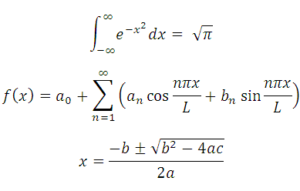As a writer, I am supposed to despise math.
Look at it, looking all smug with its cosines and discontinuous divisors and irrational numerators.
It’s just so absolutely certain about the world. I must hate it.
But I don’t. Although I’ve always been drawn to words, I’ve never been intimidated by numbers. I did pretty well in math in school, although I never went past pre-calculus.
So I’ve never understood people who freak out about math, or panic at the mere sight of an equation. This fear, I believe, turns into a self-fulfilling prophecy, and soon people are insisting that they can’t do basic addition and throwing up their hands at polling data or stiffing the waiter because they don’t dare try to figure out the tip.
But maybe these mathphobes are on to something. Because to my great disappointment, it turns out that math is a big old bigot.
Yes, a recent book argues that “math is essentially being used for evil,” in that “algorithms and big data are targeting the poor, reinforcing racism and amplifying inequality.”
Now, inflammatory (and completely misleading) claims about math being “racist” aside, the point is clear. Numbers are only as good as the humans who input them. As such, “any algorithm can — and often does — simply reproduce the biases inherent in its creator, in the data it’s using, or in society at large.”
For example, “nearly half of U.S. employers ask potential hires for their credit report, equating a good credit score with responsibility or trustworthiness.” This is despite the fact that the reliability of these reports “has remained in doubt for more than a quarter century.”
But because of our faith in data — or our fear of numbers — we continue to think an equation is “superior to human judgment — never questioning the assumptions that get baked in.”
This is a flawed assumption, and it not only helps reinforce inequality, it taps directly into that most vile of human drives: racial prejudice.
It turns out that numbers are not as culturally neutral and objective as we would like. Again, this is not because the numeral “3” somehow dislikes Latinos or the figure “864” really hates blacks. It is because “while algorithms might work with data alone, it’s always human beings that decide what factors they weigh.”
So what can be done about this issue? To begin with, simple acknowledgement is necessary, combined with the awareness that one can prove just about anything with the right set of figures.
And then we can get the world’s mathematicians to work on creating a formula that will rid the world of bigotry. That will be one truly great equation, and it will, of course, most likely equal 42.





